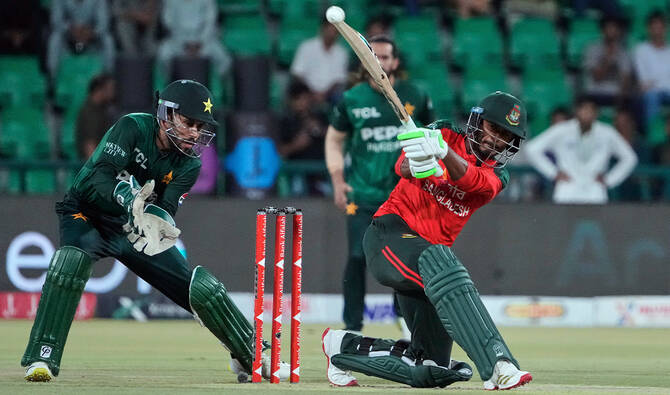KARACHI: Pakistan is eyeing investment opportunities in the Saudi and Middle Eastern markets in the Information Technology sector, caretaker minister for IT Dr. Umar Saif said on Thursday, hoping the sector’s exports could swell to about $10 billion in the short term.
The minister was speaking at a three-day exhibition titled ‘Declaring Pakistan the Regional ICT Hub’ at Karachi’s Expo Center where he spoke of Pakistan’s immense potential in the domestic and international IT market, saying that its population comprised educated and tech savvy youth.
“At this point, my highest priority is to make sure that our youth gets better skills, that they’re able to contribute to the domestic economy, and to the emerging investments and opportunities in the Middle Eastern market,” Saif told Arab News at the sidelines of the event.
“We are working closely with the Saudi market, we’re working closely with the Middle Eastern market,” he said, adding that Pakistan was also eyeing markets in Africa.
“What we do here in terms of software production, in terms of handset manufacturing, in terms of competitiveness for telecom operators, will have huge implications for the growth of the local economy as well as our export potential.”
Saif said Pakistan’s current IT exports did not reflect its real exports as many companies were not bringing export proceeds to the country.
“Currently, the IT industry employs about 150,000 people and has an export of about $2.6 billion,” he said. “I think the actual export is more than this because a lot of It companies— because these are service companies— park their money outside of Pakistan because they find it difficult to bring it to Pakistan.”
Saif said by addressing IT-related issues, the government can encourage Pakistani IT companies to bring export proceeds back to the country instead of maintaining offshore offices. He said Pakistan’s annual IT exports could be increased to $3.5 billion through these measures.
The minister said Pakistan can boost its exports from $2.6 billion to about $10 billion in the short term by undertaking strategic interventions in the IT industry and online freelancing, to make sure the youth are upskilled and contributing to the IT sector.
Speaking at the event earlier, Saif said Pakistan’s IT ministry will train 100,000 software developers through a partnership program with a private company, adding that the trainings would help enhance exports by $2 billion per annum.
To achieve this, he said various programs and boot camps would be organized to enhance the capacity of university graduates in accordance with skills that were required by the IT industry.
Saif said introduction of a de-risking mechanism for venture capital could bring back the investment trend in the country’s startup culture. “The ministry is planning to launch a fund of funds with 30 percent equity of the government,” he said.
Over 400 brands, including a Saudi-based multinational Unifonic showcased their products at the exhibition. Unifonic is involved in managing conversation platforms and AI-based voice chatbot solutions.
“We have started our operations and we see Pakistan as a big market because it’s a country with 225 million people, a very vibrant and upcoming ecommerce scenario from our perspective,” Khurram Rahat, senior country director of Unifonic, told Arab News.
The organizers of the exhibition expect over 35,000 visitors to attend the event during the three days.


















